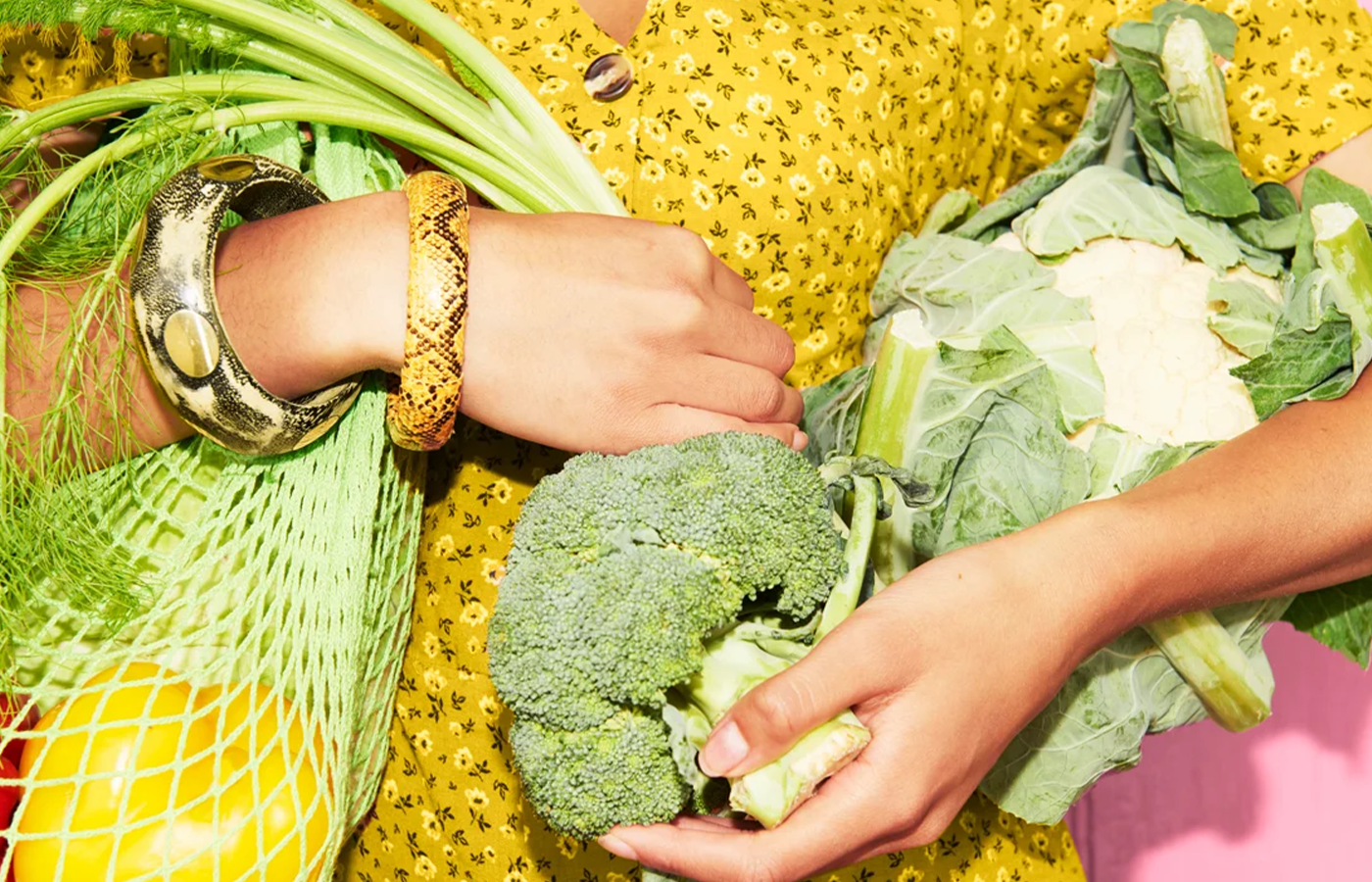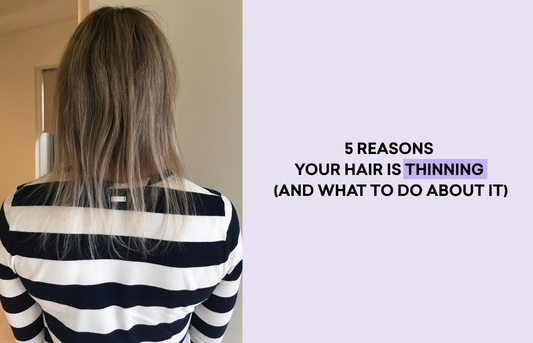How a "Healthy Diet" Can Cause Hair Loss
Sorry vegetables.
In this article
You've been eating a healthy diet for months, but you're starting to notice that your hair is falling out. You're confused and frustrated because you thought that eating healthy would make your hair healthier.
Unfortunately, there are some "healthy diets" that can cause hair loss. This is especially true for vegan diets, which are often low in protein and essential fatty acids.
In this blog post, we'll discuss how a "healthy diet" can cause hair loss. We'll also provide some tips on how to prevent hair loss and improve your hair health.
READ: Food For Thought: Is Your Diet Good For Your Hair?
What Constitutes a 'Healthy Diet'?
The notion of a 'healthy diet' varies significantly among individuals. Some find it synonymous with a diet rich in fruits, vegetables, and whole grains, while others equate it to vegetarian or vegan diets.
Still, others stick to a particular regimen like the Mediterranean diet or Paleo diet. Regardless of your interpretation, it's crucial to acknowledge that even the healthiest diet can backfire, leading to hair damage if not correctly balanced.
READ NEXT: Why You Need Silica In Your Diet For Hair Growth
Decoding the Mystery of How a "Healthy Diet" Can Cause Hair Loss
The seemingly healthy diet you've been adhering to might silently be taking a toll on your hair health. Below are some of the common reasons:
Protein Deficiency: Hair primarily comprises protein; therefore, a lack of it in your diet can induce hair thinning and loss.
Iron Deficiency: Iron, fundamental to hair growth, if deficient in your diet, can result in hair loss.
Zinc Deficiency: Zinc is another vital nutrient for hair growth, and its deficiency can be detrimental to your hair.
ALSO READ: What Vitamin Deficiency Causes Hair Loss
Understanding Hair Loss and the Vegan Diet
It's no secret that adopting a vegan lifestyle can contribute to better health, a cleaner environment, and a more compassionate world. However, despite the many benefits, some people transitioning to a vegan diet notice a rather alarming trend—hair loss.
The first step in being vegan is to give up all forms of animal-based food. While this can lead to improved overall health, if not properly balanced, it may create nutritional deficiencies that can trigger hair loss.
In the following discussion, we'll shed some light on the potential connection between hair loss and a vegan diet, highlighting how you can continue to live vegan without compromising your hair health.
READ: What's The Best Food For Hair?
Potential Causes of Hair Loss on a Vegan Diet
It's a startling revelation that a "healthy diet" can cause hair loss. Diet deficiency is a predominant cause of hair loss among men and women alike. So, what are the critical nutrients for healthy hair growth, and how can you ensure their optimal intake?
Protein Deficiency: Hair is predominantly made up of a protein called keratin. A protein-poor vegan diet may lead to hair thinning and eventually hair loss.
Iron Deficiency: Iron is vital for the production of hair cell protein. A vegan diet may fall short on iron, potentially causing hair loss.
Vitamin B12 Deficiency: Primarily found in animal-derived foods, a lack of Vitamin B12 in a vegan diet may contribute to hair loss.
Insufficient Omega-3 Fatty Acids: Omega-3 fatty acids are essential for a healthy scalp and hair. A deficiency could potentially result in a dry scalp and dull hair.
READ NEXT: What Causes Thin Hair And How To Get Your Thick Locks Back
Keeping Your Hair Healthy on a Vegan Diet
Fortunately, hair loss due to a vegan diet is not a foregone conclusion. There are ways to ensure that your hair remains healthy while maintaining your vegan principles:
Prioritize Protein-Rich Vegan Foods: Embrace protein-packed vegan options like lentils, chickpeas, quinoa, and tofu to ensure adequate protein for your hair.
Optimize Your Iron Intake: Foods such as lentils, beans, quinoa, and spinach are iron-rich and vegan-friendly. Consider consuming them with Vitamin C-rich foods to improve iron absorption.
Include B12-Fortified Foods or Supplements: As vitamin B12 is mainly found in animal products, consider including fortified foods like plant-based milk, breakfast cereals, or B12 supplements in your diet.
Don't Forget Omega-3 Fatty Acids: Flaxseeds, chia seeds, hemp seeds, and walnuts are fantastic plant-based sources of Omega-3 fatty acids.
ALSO READ: 10 Ways To Detox Your Hair To Make Your Hair Grow
Defining the Difference Between Vegetarian and Vegan Diets
Firstly, it's crucial to clarify the distinction between vegetarian and vegan diets. Vegetarians exclude meat and fish from their diet but continue to consume eggs and dairy products. On the other hand, vegans abstain from all animal products, including eggs and dairy.
This fundamental difference has implications for hair health, particularly regarding nutrient intake.
CHECK THIS OUT: This Is How Gut Health Affects Your Hair and Skin
Hair Health on Vegetarian vs. Vegan Diets
Vegetarian diets may offer certain benefits for hair health due to the inclusion of eggs and dairy, which provide vital nutrients like protein, vitamin B12, and iron. However, if the diet isn't well-balanced, it could potentially lead to hair shedding.
Meanwhile, the vegan diet, while associated with thicker, shinier hair due to a high intake of antioxidants, can pose a higher risk of hair loss if not properly balanced.
This is mainly due to the exclusion of animal products, which are primary sources of vital hair health nutrients such as protein, iron, and zinc.
TRENDING: Try This Protein Packed Hair Treatment With Egg
Table Summary

Maintaining Hair Health on Vegetarian and Vegan Diets
While both "healthy diets" can cause hair loss if not properly managed, a well-planned diet can certainly mitigate these risks. Whether you're a vegetarian or vegan, the key to maintaining hair health lies in ensuring your diet is rich in all necessary nutrients.
Switching to a plant-based diet doesn't mean sacrificing your hair health. With careful planning and attention to nutrient intake, both vegetarian and vegan diets can support not just overall health, but also the health of your hair.
Keep in mind, balance is the key. Because when your diet is balanced, your hair not only survives but thrives, just like you.
Love More Hair Care Tips? Read These Next:

Just high quality, beautifully designed halo hair extensions for natural, down to earth bombshells.
Shop now



